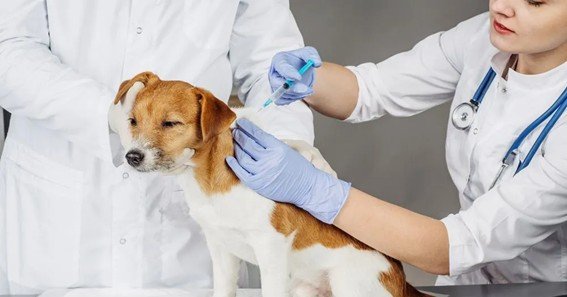As pet owners, we all want our furry family members to live long, healthy, and happy lives. One of the most important ways we protect them is by giving preventative care for pets through proper vaccination.
At Coastal Creek Animal Hospital, we often find that pet parents have many questions about vaccines—which ones are necessary, how often they should be given, and what protection they provide. This comprehensive guide will help you understand the crucial role vaccinations play in your pet’s overall health and well-being.
Why Vaccinations Matter for Pets
Vaccinations have revolutionized pet healthcare much as they have for humans. Before widespread vaccination programs, diseases like distemper, parvovirus, and rabies regularly claimed the lives of beloved pets. Today, these diseases are much less common—not because they’ve disappeared but because we’ve created a shield of protection through consistent vaccination.
Vaccines work by stimulating your pet’s immune system to recognize and fight specific disease-causing organisms. They prepare the body to fight future infections by introducing a safe version of the disease agent (either weakened, killed, or partial) that doesn’t cause illness but triggers an immune response.
Core vs. Non-Core Vaccines: Understanding the Difference
Veterinarians typically categorize vaccines as either “core” or “non-core.” This distinction helps pet owners understand which vaccines are universally recommended and which might depend on your pet’s specific lifestyle, geographic location, or risk factors.
Core Vaccines for Dogs
Core vaccines are recommended for all dogs regardless of circumstances:
- Rabies: Required by law in most places, this vaccine protects against a fatal virus that can be transmitted to humans.
- Distemper: Protects against a highly contagious viral disease affecting the respiratory, gastrointestinal, and nervous systems.
- Parvovirus: Guards against a severe, highly contagious gastrointestinal illness that can be deadly, especially for puppies.
- Adenovirus (Canine Hepatitis): Prevents infectious hepatitis, which attacks the liver, kidneys, and eyes.
Core Vaccines for Cats
For our feline friends, these vaccines are considered essential:
- Rabies: Just as with dogs, this protects against the deadly rabies virus.
- Panleukopenia (Feline Distemper): Prevents a highly contagious viral disease that causes severe gastrointestinal illness and can be fatal.
- Feline Calicivirus: Protects against a common respiratory disease.
- Feline Herpesvirus Type 1 (Rhinotracheitis): Guards against another major cause of upper respiratory infections.
Non-Core Vaccines
These vaccines may be recommended based on your pet’s exposure risk:
For Dogs:
- Bordetella (kennel cough)
- Leptospirosis
- Lyme disease
- Canine influenza
- Parainfluenza
For Cats:
- Feline leukemia virus (FeLV)
- Feline immunodeficiency virus (FIV)
- Chlamydia
- Bordetella
Vaccine Schedules: When Should Your Pet Be Vaccinated?
Puppy Vaccination Schedule
Puppies typically follow this general schedule:
- 6-8 weeks: First DHPP (distemper, hepatitis, parainfluenza, parvovirus)
- 10-12 weeks: Second DHPP, possible non-core vaccines based on risk
- 16 weeks: Third DHPP, first rabies vaccine
- 12-16 months: DHPP booster, rabies booster
- Adult dogs: DHPP every 1-3 years, depending on the vaccine type, rabies according to state law (typically every 1-3 years)
Kitten Vaccination Schedule
Kittens generally follow this pattern:
- 6-8 weeks: First FVRCP (feline viral rhinotracheitis, calicivirus, panleukopenia)
- 10-12 weeks: Second FVRCP, FeLV for at-risk kittens
- 14-16 weeks: Third FVRCP, FeLV booster, first rabies
- 12-16 months: FVRCP booster, rabies booster
- Adult cats: FVRCP every 1-3 years, rabies according to state law (typically every 1-3 years)
Common Questions About Pet Vaccinations
Are Vaccines Safe for My Pet?
Vaccines are generally very safe, and serious adverse reactions are rare. The risk of disease without vaccination far outweighs the small risk of a vaccine reaction. However, some pets may experience mild side effects, including:
- Soreness at the injection site
- Mild fever
- Reduced appetite
- Lethargy for a day or two
Severe reactions like anaphylaxis are extremely rare but require immediate veterinary attention.
Can Vaccines Cause Illness?
Modern vaccines are highly unlikely to cause the disease they prevent. Some pets may experience mild symptoms as their body builds immunity, but these are typically much less severe than the actual disease.
Do Indoor Pets Need Vaccines?
Even pets that live exclusively indoors benefit from core vaccinations. Many viruses can be carried into your home on shoes or clothing, and indoor pets need protection in case they escape or need boarding during emergencies.
Can Senior Pets Skip Vaccinations?
Older pets still need protection from disease, though vaccination schedules might be adjusted based on their health status and risk factors. Your veterinarian can help determine the appropriate vaccination plan for your senior pet.
Are Vaccines Required by Law?
Rabies vaccination is legally required for dogs in most states, and often for cats as well. Requirements for other vaccines vary by location and circumstances (like boarding facilities or dog parks).
The Broader Impact: Community Immunity
When we vaccinate our pets, we’re not just protecting them as individuals—we’re contributing to the health of all animals in our community. This concept, similar to “herd immunity” in humans, helps reduce the presence of dangerous diseases in the pet population.
By maintaining high vaccination rates in the community, we help protect:
- Very young puppies and kittens that haven’t completed their vaccine series
- Senior pets with compromised immune systems
- Pets who can’t receive certain vaccines due to medical conditions
Tailoring Vaccination Plans to Your Pet’s Needs
While vaccination guidelines provide a framework, the ideal approach is to work with your veterinarian to create a vaccination plan tailored to your pet’s specific needs. Factors that might influence this plan include:
- Age and health status
- Lifestyle (outdoor access, exposure to other animals)
- Geographic location and local disease risks
- Travel plans
- Boarding or daycare requirements
- Previous vaccine reactions
Beyond Vaccines: A Holistic Approach to Pet Health
While vaccines are crucial for disease prevention, they’re just one component of your pet’s overall preventative healthcare. For optimal protection, combine vaccinations with:
- Regular wellness exams
- Parasite prevention
- Dental care
- Appropriate nutrition
- Regular exercise
- Weight management
Final Thoughts
Vaccinations represent one of the most significant advances in veterinary medicine, allowing our pets to live longer, healthier lives. By understanding which vaccines your pet needs and following recommended schedules, you provide them with essential protection against potentially devastating diseases.
Remember that vaccination needs may change throughout your pet’s life. Regular discussions with your veterinarian ensure your pet receives the most appropriate preventative care as their age, health, and lifestyle evolve.
When it comes to pet vaccines, the old saying rings especially true: an ounce of prevention truly is worth a pound of cure.










